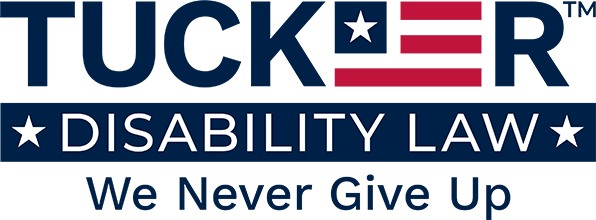You served your country with honor, but are you getting the benefits you truly deserve? If you’re among the thousands of veterans who suspect your VA disability rating is too low, trust that instinct.
Every month, we hear from veterans who discovered they were significantly undercompensated for years—missing out on thousands of dollars in benefits they had rightfully earned through their service and sacrifice.
At Tucker Disability Law, we believe in our motto: “We Never Give Up.” That same determination should guide you when it comes to ensuring you receive every benefit you’ve earned. Here are five key signs that your VA disability rating may be too low.
1. Your Symptoms Have Worsened Since Your Last VA Disability Rating
The Reality: Disabilities don’t stay static. What started as mild knee pain from a parachuting injury in your twenties may now severely limit your mobility in your forties or fifties.
What to Watch For:
- You’re using assistive devices (canes, braces) that you didn’t need before
- Activities you could previously manage now cause significant pain or difficulty
- You’re taking stronger medications or require more frequent medical treatment
- Your sleep, work, or daily activities are more significantly impacted
Action Step: Document these changes thoroughly. Keep a daily log of symptoms, limitations, and how they affect your life. Medical records showing progression are crucial evidence. Click here to download Tucker Disability Law’s exclusive Capability Journal for an easy-to-use guide to documenting your symptoms.
2. You’ve Developed Secondary Conditions Affecting Your Rating
The Reality: One service-connected condition often leads to others, and many veterans don’t realize these secondary conditions can also be rated and compensated, potentially indicating your overall VA disability rating is too low.
Common Examples:
- Back injury leading to depression due to chronic pain and lifestyle limitations
- PTSD contributing to sleep disorders or substance use issues
- Joint injuries causing gait problems that affect other joints
- Hearing loss contributing to social isolation and mental health challenges
What This Means: Each secondary condition that’s linked to your original service-connected disability can receive its own rating, potentially significantly increasing your overall compensation.
3. Your Mental Health Impact Suggests Your VA Disability Rating Is Too Low
The Reality: The VA has evolved its understanding of mental health conditions, particularly PTSD, depression, and anxiety. Ratings from several years ago may not reflect current evaluation standards or the full scope of your mental health challenges.
Signs to Consider:
- Your PTSD rating was assigned years ago and doesn’t account for worsening symptoms
- You experience cognitive issues (memory, concentration) that affect work or relationships
- Social isolation, relationship problems, or occupational impairment aren’t reflected in your rating
- You’ve developed new mental health conditions since your original rating
Important Note: Mental health conditions are often underrated initially, and the VA’s understanding of complex PTSD and trauma-related conditions continues to evolve.
4. You Can’t Work, Indicating Your Rating May Be Insufficient
The Reality: If your service-connected disabilities prevent you from maintaining substantially gainful employment, you may qualify for Total Disability Individual Unemployability (TDIU), even if your combined rating is less than 100%.
Key Indicators:
- You’ve had to leave jobs due to your service-connected conditions
- You can only work part-time or in significantly reduced capacity
- Employers have accommodated your disabilities, but you still struggle
- You’re unable to pursue the career you trained for due to your conditions
The Opportunity: TDIU provides compensation at the 100% rate, even with lower combined ratings, for veterans who can’t work due to service-connected disabilities.
5. Your Current VA Disability Rating Doesn’t Match Your Actual Limitations
The Reality: Sometimes there’s a disconnect between how your disabilities actually affect your life and how they’re rated in the VA system, suggesting your VA disability rating is too low.
Questions to Ask Yourself:
- Does your rating reflect your worst days, or just your average days?
- Are all your symptoms and limitations documented in your VA file?
- Have you had thorough Compensation & Pension (C&P) exams that accurately captured your condition?
- Do you feel the examiner understood the full impact of your disabilities?
Common Issues: Brief C&P exams, conditions that fluctuate in severity, or examiners who don’t fully grasp the complexity of certain conditions can all lead to underrated disabilities.
Taking Action When Your VA Disability Rating Is Too Low
If any of these signs resonate with you, it may be time to pursue a rating increase. Here’s how to move forward:
Gather Your Evidence:
- Collect all current medical records
- Document daily limitations and symptoms
- Get statements from family, friends, or employers about how your conditions affect you
- Ensure your VA medical records are up to date
Consider Professional Help: The appeals process can be complex, and the stakes are high. An experienced VA disability attorney can help ensure your case is presented effectively and that all potential secondary conditions are identified and claimed.
Don’t Wait: With the 2026 Cost of Living Adjustment (COLA) on the horizon, a higher rating now means increased benefits not just immediately, but compounded with future COLA increases.
Remember: You’ve Earned These Benefits
Your service to our country came with sacrifices, and if those sacrifices continue to impact your life, you deserve fair compensation. The VA disability system exists to provide for veterans who gave so much in service to others.
If you recognize yourself in any of these five signs indicating your VA disability rating may be too low, don’t accept less than you deserve. Just as you didn’t give up in service to your country, don’t give up on fighting for the benefits you’ve ear
At Tucker Disability Law, we specialize in helping veterans navigate the VA disability system and fight for the benefits they deserve. Our motto is “We Never Give Up”—and neither should you. If you’re considering a rating increase or appeal, we’re here to help guide you through the process.
Use the blue contact section to call us, live chat with us, or message us. You can also message us using our confidential contact form







